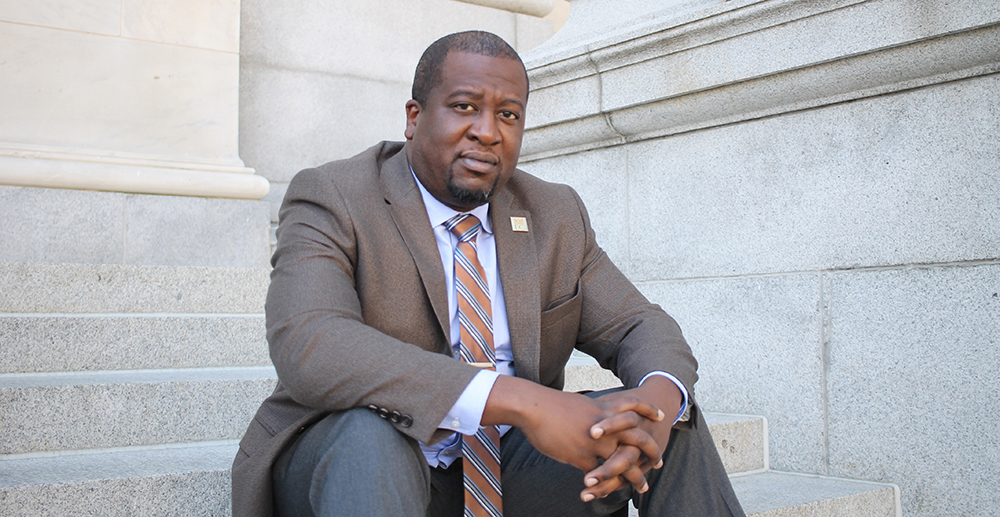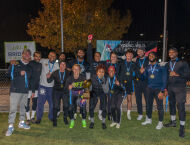Culture
 Photo: Trent Johnson
Photo: Trent Johnson
DC’s Director of Nightlife and Culture Reflects on First Year
November 2, 2019 @ 12:00am
To embark on any new endeavor – creative, personal or professional – can be a daunting hill to climb for anyone, and DC government is no exception. Even with the support of Mayor Muriel Bowser and others, Shawn Townsend, who became the first-ever director of the Mayor’s Office of Nightlife and Culture (MONC) early this year, has a lot on his plate.
His energy and excitement to be first in this role is apparent as is his mission: to make nightlife accessible to everyone. In addition to helping shape the position for the first time in the District’s history, Townsend’s tenure has been greeted with skepticism of which he’s well-aware.
After a four-year stint at DC’s Alcoholic Beverage Regulation Administration (also known as ABRA), he knew he could offer a unique perspective and wealth of experience to the city, but worried constituents would see him as another enforcer of the law. However, some of the public’s concerns were born from a simple misunderstanding of Townsend’s role.
“Critics will say, ‘He comes from enforcement, so he’s going to be looking to write folks up and get people in trouble,’” he says. “But we don’t have any regulatory authority or enforcement authority. We’re simply here to connect the dots between stakeholders, businesses, residents and agencies. All of that helps make nightlife better.”
Townsend’s role involves more listening and creative conflict resolution than anything else. He says his team hit the ground running on a wide array of issues since Mayor Bowser appointed him to the new position in November 2018, and they’ve resolved 98 percent of the 63 issues under their purview.
He notes that one of his proudest moments so far involved helping a local music venue apply for a grant to receive funds for better noise abatement technology after receiving constant complaints. With a MONC letter of support and a grant application through the DC Department of Small & Local Business Development, the venue was able to make the necessary improvements to mitigate the noise and continue business. According to Townsend, it’s evidence that slowly but surely, he and his team are seeing the fruits of their labor.
“The idea is to have someone on the government side serve as a liaison to the nightlife economy – to really put an emphasis on changing the dialogue from the city government thinking about life in the daytime to thinking about [and] allocating more resources to our life at night, because the cities have generated so much revenue from [it]. It’s a catalyst for revenue and a catalyst for jobs, [and] for social inclusion [and] cultural diversity.”
While this misunderstood territory is uncharted for DC, it’s not for other cities. They look to, and follow, the best practices of other locations with similar roles. Still, the District’s unique music history – Black Broadway, renowned venues, and iconic genres like go-go and hardcore, to name a few standouts – makes it a different beast to tackle altogether from a bureaucratic standpoint.
With the added elements of nightlife safety and respecting the city’s creative legacies, Townsend must take into account the many intersections that exist within what happens on DC streets when the sun goes down.
“When it comes to the culture piece, we’ve sat down with festival organizers,” he continues. “We’ve discussed the #Don’tMuteDC movement with artists and creatives. We have some artists and folks in the performing arts and creative industries on our nightlife and culture commission. So [we are] really having those conversations to figure out what the agenda is of the creatives, and how we can help push that agenda forward to other agencies and to the Mayor and say, ‘This is what we’re hearing on the ground.’”
And while Townsend is quick to say he’s a fan of all nightlife in DC, he’s certainly taken office during a time both challenging and exciting to be at the helm of such a project. When asked about any standout moments that reflect how DC nightlife is changing, he mentions the poignancy of watching the Washington Mystics take home the WNBA championship trophy last month.
“[At the] Entertainment and Sports Arena, standing there and seeing the clock wind down to a sold-out crowd and [the Mystics] bringing a championship trophy to Southeast was an experience for me,” he recalls. “I’ve been in the region since the early 90s, and I remember what that area used to be.”
He says it touched him to see Monumental Sports and the Leonsis Family collaborate with local government and Events DC to help boost the economy in that quadrant of the nation’s capital.
“It’s an example of us investing in parts of the city that don’t necessarily have nightlife amenities, including sports. I look forward to the expansion of the St. Elizabeths campus to have more nightlife.”
The office has made great strides, and Townsend and his team hope to continue bridging creative and commercial gaps for years to come.
For more on MONC, visit www.moca.dc.gov and follow the office on social media @DCMONC.







